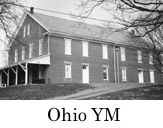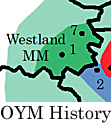The following is the entirety of the memorial:
When I came to Olney first, in the fall of 1892 to teach school at Olney, there was a member of the school committee who always interested me, because of his great interest in school work and his wide general education. He had at one time been a teacher here as well as at Mount Pleasant, and knew the school well and understood boy and girl nature. As a teacher he created a wonderful interest in the study of physics and chemistry by giving lectures to the school on these subjects. Later he and his wife were to serve two terms as superintendent and matron, very acceptably, his wife having also been a former teacher. If you look up the school history you will find William Ashton's name identified with the organization of the Olney Literary Society. It appears among the first signers of its constitution about the year 1876, and there never was a time up to the day of his death that he was not interested in this place [Olney]. Never a man of many words, yet he was appreciated by his associates as a strong character and as a man of very sterling worth. A member of the Boarding School Committee from away back in the eighties, he was always liberal in his views, yet with it all consistent in his Friendliness. At the time of his death he had in his home some books which he was examining to see if they were suitable for our library. Often he had handed the writer a book, with the remark, "make what use of it thee thinks will do the most good," and several books the students of this school have read are books that have come through this generosity and farsightedness.
William Leech Ashton was born Eighth Month 3rd, 1848, in Columbiana County, Ohio. He was the son of Barak and Jane (Leech) Ashton, and was one of a family of five children of whom two sisters survive him, residing near the family home. He was married first in 1876 to Eliza Holloway, the daughter of Jacob and Sara F. Holloway of Flushing and settled on a farm in that vicinity where he resided until 1895, when he moved to another farm in the same neighborhood. His wife Eliza died in 1888 after a very brief illness and in 1891 he was married to Dorothy Hobson Stratton, who survives him.
During the time of his active life he served the Society for years as Clerk of many or most of the various meetings and committees with which he was connected and at the time of his death, Twelfth Month 7th, was an Elder, having served in that capacity for a number of years.
William Ashton was widely known throughout the community in which he lived as a surveyor of ability and experience having surveyed many of the farm and town lots about his home as well as the coal mines which were first opened and much of the addition of the town of Holloway. As a young man he assisted in the laying out of a railroad in his own county. He continued the work of surveyor as long as he had strength. He was also known as an orchardist and lover of small fruit, and a supply of small fruit has almost always been available in season on his farm. The writer remembers that the last time he saw him alive he went out to the orchard and brought for his guests a basket of apples. This was very characteristic of him, as at yearly meeting time he was apt to wander through the school orchards and return with pockets full of choice specimens, which he invariably laid up somewhere for the guests. Many of these trees he had a hand in planting and the inmates of this institution who have found the chestnut trees on the twenty acres which bears the rather unusually large chestnuts, have him to thank for them as he planted the trees while Superintendent here.
In looking back over the years of close association with William Ashton, one is tempted to query, are there young people coming on who will give to their generation as he gave to his? Not only to the Society of Friends, but in some useful way in the community in which they live. Perhaps some will say "I haven't the ability." Perhaps not, but, let us never permit ourselves to be satisfied with the line of least resistance, and selfish gain, but rather choose the better part, and so occupy our talents that men may say of us, "His life was well lived." |






